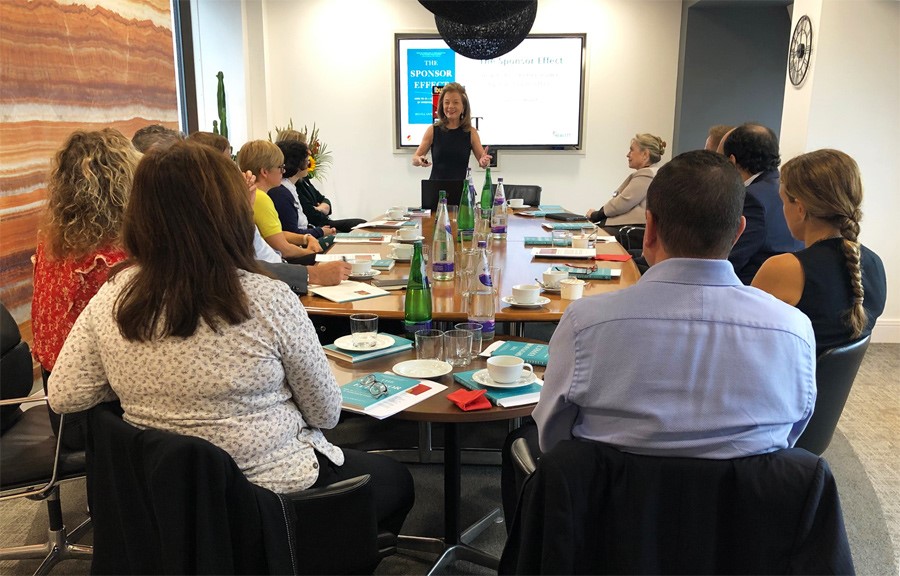Being a sponsor for high potential talent within your organisation doesn’t just benefit them – it also helps you further your career. Research shows that senior managers with protégés are 53% more likely to have received a promotion. Despite this, many executives are reluctant to take on a sponsor, seeing it as an additional burden on their already stretched time or are unable to differentiate between sponsoring and mentoring.
With this in mind we invited Sylvia Hewlitt, economist, CEO of Hewlett Consulting Partners, founder of the Centre for Talent Innovation and author of fourteen critically acclaimed books to speak to an audience of Senior HR leaders. In her latest book The Sponsor Effect, Sylvia highlights how one of the most overlooked ways to become a better leader is by sponsoring others and establishing a two-way relationship. Her book has received much acclaim since launch and The Sponsor Effect was named an FT Best Business Book for June.

Understanding the Sponsor/Protégé Value Relationship
Sponsorship shouldn’t be a one-way street and, in that regard, it is different from mentoring. In a mentoring relationship, the mentee is often passive, whereas a sponsor is expected to push back. Sponsorship is how power is transferred within organisations – it’s how the baton is passed. Sylvia says The Sponsor Effect helps to quantify and make more transparent a process that has gone on through the ages.

A sponsor is a senior person who sits in a seat and can open doors for the protégé. That person must do three things:
- Really understand and believe in the value of their protégé. This doesn’t happen overnight, and sponsors are expected to advocate their protégés behind closed doors in order to enable them to take risks. Superficially the data shows that white men take more risk than people of colour or women. Not true says Sylvia. Individuals who are smart don’t take risks unless they have a sponsor as they know that if they fail they will be out. When female or people of colour protégés have sponsors they take just as much risk as their white male counterparts. “Above all else though” Sylvia stresses, “a protégé has to deliver value. The relationship is based on an alliance around value so the performance has to be there.”
- Secondly trust has to be absolute. It’s vital this person is committed to the team and is loyal to the company and the mission. This person will be walking around with your brand on their forehead.
- The third requirement is that there is a dimension of difference, that they are adding something that is not found elsewhere within the team.

Tiger & Katie
Tiger was looking for a different muscle on his executive committee. As the company was expanding he was looking for a more sympathetic voice that could challenge the primarily male exec committee and had real ‘chops’. The other value he was looking for was a woman. The executive board at that time was largely male and through an expansion in Romania they saw an opportunity to capitalise on the strong female workforce there. Tiger wanted them to become a talent magnet, but recognised that you can’t be what you can’t see. He set a mandate to increase diversity at the highest levels of the business. He found Katie a couple of tiers down within the organisation and after several interviews felt she was the person for the job.
So, what was in it for Katie? Tiger was offering her an exec committee spot at a large company which was of course attractive, however Tiger also helped set her up to succeed. For example, Katie was told she needed to present the company’s strategy to a room of investors. Rather than leaving it at that, Tiger set her up with an executive coach and arranged a number of meetings for her to meet investors before the day of the big event. When the day came around Katie not only delivered but wowed investors with her pitch. It’s this level of commitment Sylvia says that a sponsor needs to give in order to help make the relationship work.
Tiger got a 26% increase in female recruitment in Romania and an individual willing to challenge the other execo members. These are quantifiable outcomes that helped to build Tiger’s “aura”. Mentoring might make you feel good and does provide a halo effect but sponsoring is about delivering real business value.

Subha and Todd
Subha was seen as someone open to new ideas and opportunities at the large bank she worked at. Her protégé Todd was three levels below. Todd turned up in Subha’s office one day with an idea. He is a prominent gay activist and has great access among the LGBTQ community. Todd showed Subha how the gay community have different needs. Their life planning is different for instance, with only 14% having children. Todd felt that they needed different financial products and a new approach. Subha listened and although it sounded like a good opportunity she wanted to test him. So Subha gave him some money and asked him to run a pilot. Todd returned within a year demonstrating success and five years later they had built it into a $15 billion business. They both got promotions in recognition of their work.

Jonathan and Mita
Jonathan works at a prominent FMCG but they needed to increase engagement within their business. He met Mita when she was hired for a job in Marketing. He took the time to get to know Mita whose grandparents were from Rajasthan and got married at 10 and 11. Her grandfather was an activist who was imprisoned by the British when India was under British rule. Mita was a powerful storyteller and could also connect her own tough upbringing with why she chose the company they worked at and so was a natural ambassador for the company. Jonathan gave her the platform for her to influence and Mita presented at numerous conferences which greatly raised the profile of the company and how they engage their employee base. They both got promotions.

John and Melody
Melody saw a huge future for herself at a US wealth manager known for its large African American customer base. Melody idolised the CEO at the time, John Rogers, and jumped at the opportunity to become his EA when the role came up. Melody worked as hard as she could to impress John. If John needed time in his diary she made it happen. If there was a client that felt undervalued and was pestering John, Melody stepped in and looked after them. Once she became indispensable Melody then approached John with an idea. She highlighted how African women earn 2/3rds more than African American men. She then questioned why 75% of their client base was male. She asked permission to do some market research and put on a couple of events. She ran the research, hosted the events and put a strategy and plan in place. By 29 she was the president of the firm.
How Should You Choose a Protégé?
Firstly, you need to figure out whether this person is a team player. Ask yourself, do they really respect me? Are they going to stick around? Can I trust them? You’ll need to invest political capital in them so it’s a decision that needs careful consideration.
Sylvia suggests that the ideal portfolio is three junior talents, two of which aren’t like you. She says, “you can have one mini me but the other two have to have a dimension of difference whether it be gender, race, geography, generational, disabilities, LGBTQ or military service.” The benefit for corporates is that this gives senior managers a sense of agency and allows them to either pick talent from across the organisation or bring in talent that adds an element of diversity to the organisation.
Common Mistakes
When a Financial Services group launched a large sponsorship programme three years ago they gave all their executives a 37-page handbook which detailed what they had to do for their protégés while the protégés got nothing. Five months later the programme was dead. Sponsorship needs to be presented as an opportunity to provide enormous value for the sponsor. If it’s not presented in this way, then a rational, overcommitted leader will be unlikely to see the value in it.
When sponsor relationships break down it’s often not because of a failure of performance but because of a betrayal. As a sponsor you have to be very vocal in your support of your protégé so it’s crucial to be clear up front what is in it for both of you. Sylvia explains that in her experience expectations will differ between genders. When she asks male protégés what they want in a sponsor they will typically say someone with power who they respect. Women tend to have a longer list; someone with power that they respect but who is also a woman and a mother etc. Don’t confuse a sponsor with a role model Sylvia says.
What Next?
When positioned in the right way, sponsorship can create huge value for both the sponsor and the protégé, as well as increasing diversity of thought within key areas of the business. To be successful, it requires the sponsor to see and understand the value of being a sponsor and to be willing to invest the time to provide the protégé with the support they need. When it works however, like in the stories Sylvia shares, the outcome can be powerful as protégés work on stretch assignments which can yield significant upside.
Sylvia’s latest book The Sponsor Effect is available on Amazon and from all good book stores.




